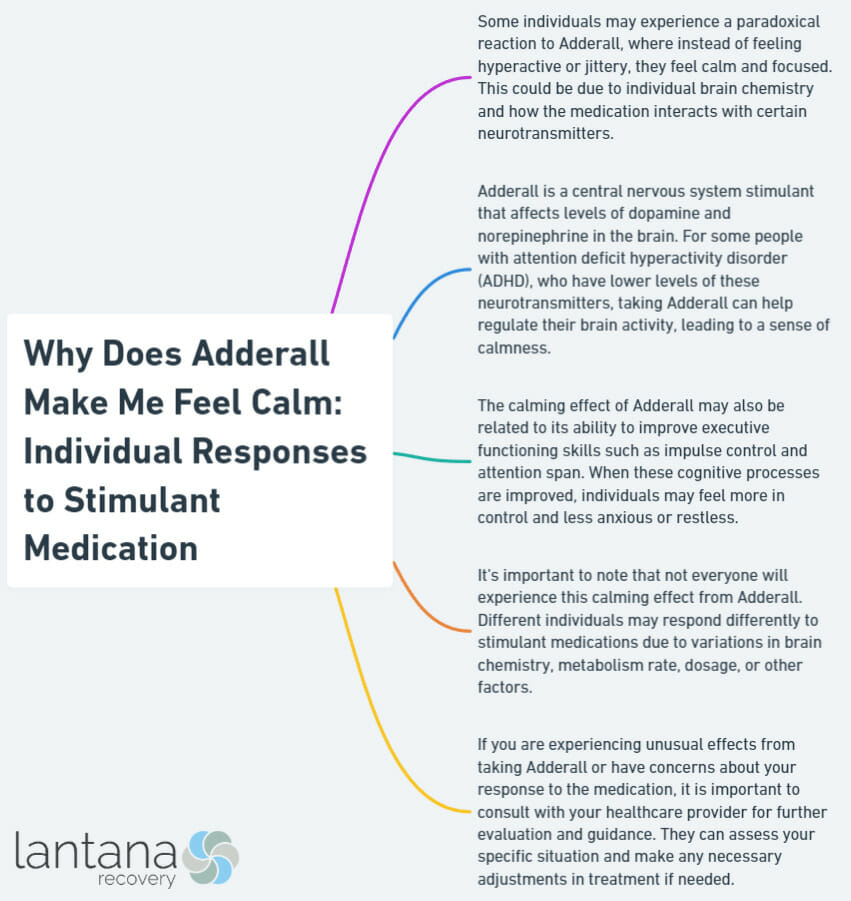Adderall, a commonly prescribed stimulant medication, is known for its ability to increase alertness and focus in individuals with attention deficit hyperactivity disorder (ADHD). However, it is interesting to note that individual responses to Adderall can vary significantly. Some individuals may experience increased calmness while others may feel increased anxiety or restlessness. Understanding these individual responses is crucial in optimizing treatment outcomes and ensuring the well-being of patients.
To begin with, it is important to have an introduction to Adderall and its mechanism. Adderall is a combination medication that contains amphetamine and dextroamphetamine. It works by stimulating the central nervous system, specifically targeting the areas responsible for regulating attention, concentration, and impulse control. This increase in brain activity is why Adderall typically causes increased alertness and focus in individuals with ADHD.
Individual responses to Adderall can differ due to a variety of factors. Some individuals might experience a calming effect when taking Adderall. This may be attributed to the medication’s ability to improve focus and reduce impulsivity, leading to a sense of inner peace and tranquility. On the other hand, some individuals may experience increased anxiety or restlessness. This could be due to the heightened activation of the central nervous system, which can lead to an overstimulated state.
Neurotransmitters, such as dopamine and norepinephrine, play a crucial role in individual responses to Adderall. Dopamine, known for its role in reward and pleasure pathways, is thought to contribute to the calming effects of Adderall. Norepinephrine, which is involved in the body’s “fight or flight” response, may contribute to increased anxiety or restlessness in some individuals.
In addition to neurotransmitters, there are several contributing factors that can influence individual responses to Adderall. Body chemistry and metabolism can affect how the medication is processed and its overall effects. Underlying mental health conditions, such as anxiety or bipolar disorder, can interact with Adderall and influence individual responses. Interaction with other medications or substances can also impact the effects of Adderall. Furthermore, genetic variations can play a role in how an individual responds to the medication.
Understanding and managing individual responses to Adderall requires open communication with healthcare providers. It is essential to discuss any concerns or side effects experienced while taking the medication. Exploring alternative treatment options might be necessary for individuals who do not respond well to Adderall. Customizing dosage and timing based on individual needs can also help optimize the benefits and minimize any adverse effects.

Why Does Adderall Typically Cause Increased Alertness and Focus?
Adderall typically causes increased alertness and focus by increasing the activity of certain neurotransmitters in the brain. The medication is composed of amphetamine and dextroamphetamine, which stimulate the release of dopamine and norepinephrine. By preventing these neurotransmitters from being taken back up into the nerve cells, Adderall prolongs the activation of their receptors. This heightened activity in specific brain regions enhances cognitive functioning, including attention, concentration, and working memory.
It’s important to note, however, that the effects of Adderall can vary from person to person. While most individuals experience increased alertness and focus, some may have different responses to the medication, including side effects.
Amphetamine was discovered in the early 20th century to have stimulating effects. Initially used to treat conditions like narcolepsy and ADHD, Adderall’s ability to increase alertness and focus proved beneficial. Advances in research have provided a better understanding of how the medication works and its impact on neurotransmitter systems.
Today, Adderall is commonly prescribed for individuals with ADHD, as it helps improve their attention and focus, enabling them to better manage their daily tasks and responsibilities. Its efficacy in enhancing alertness and focus has led to its widespread use in the treatment of ADHD and other related conditions.
How Does Adderall Stimulate the Central Nervous System?
Adderall stimulates the central nervous system by increasing the levels of dopamine and norepinephrine in the brain, according o a study understanding the pharmacology of amphetamine… the active ingredient in Adderall. By binding to transporters in brain cells, the active ingredients in Adderall, amphetamine and dextroamphetamine, prevent the reuptake of these neurotransmitters.
Consequently, dopamine and norepinephrine accumulate in the synaptic cleft, resulting in heightened alertness, focus, and attention. The improved concentration, task engagement, energy levels, and motivation that can be achieved through this mechanism can contribute positively to productivity.
Furthermore, the release of dopamine in the brain’s reward system can reinforce behaviors linked to its release, leading to feelings of pleasure and enhanced motivation. It’s crucial to recognize that the precise mechanisms by which Adderall affects the central nervous system are intricate and not fully comprehended.
The individual response to Adderall may vary, with some individuals experiencing different effects or side effects. Familiarity with how Adderall stimulates the central nervous system can assist healthcare providers and individuals in making well-informed decisions regarding its use and potential benefits.
What Are the Desired Effects of Adderall?
The desired effects of Adderall, including increased focus, improved attention span, enhanced cognitive performance, and decreased hyperactivity, effectively manage symptoms of ADHD and narcolepsy. Adderall is a prescription medication that stimulates the central nervous system and targets dopamine and norepinephrine neurotransmitters.
By boosting dopamine levels in the brain, Adderall regulates motivation, reward, and pleasure, resulting in increased motivation, improved concentration, and enhanced mood. Additionally, it increases norepinephrine levels, leading to improved attention and focus.
It is important to note that the effects of Adderall can vary. While some individuals experience a calming effect that regulates hyperactivity and impulsivity, others may experience increased anxiety or restlessness due to central nervous system stimulation.
Various factors can influence the effects of Adderall, including body chemistry, metabolism, mental health conditions, and genetic variations. Therefore, close monitoring by a healthcare provider is crucial to make necessary adjustments to dosage and timing.
It is worth emphasizing that misuse of Adderall by individuals without ADHD can have serious health consequences, including addiction, heart problems, and psychosis. Therefore, it is essential to only take Adderall as prescribed by a healthcare professional.

Individual Responses to Adderall
Individual responses to Adderall can vary based on dosage, body chemistry, and pre-existing conditions. It is crucial to consult with a healthcare professional before starting or adjusting a medication regimen.
The response to Adderall can differ depending on the prescribed dosage. A lower dosage may result in a subtle, more focused effect, while a higher dosage may have a more pronounced effect on attention and focus.
Additionally, each individual’s unique body chemistry can affect how Adderall interacts with the brain and nervous system. Some individuals may experience increased alertness and improved concentration, while others may feel more calm and relaxed.
Moreover, individuals with pre-existing conditions like anxiety or ADHD may have different responses to Adderall. For those with ADHD, it can help improve focus and reduce hyperactivity, while providing a calming effect for individuals with anxiety.
To ensure the best results, it is essential to openly communicate with your healthcare provider about your responses to Adderall. They can adjust the dosage or explore alternative treatments if needed.
Remember, finding the right medication and dosage is a collaborative process between you and your healthcare team.
Why Does Adderall Make Some People Feel Calm?
Adderall, a stimulant medication, increases alertness and focus in individuals with ADHD. However, some people may feel calm when taking Adderall.
The calming effect of Adderall is due to its impact on brain chemistry. Adderall increases dopamine and norepinephrine levels in the brain, which regulate mood and arousal.
Increased dopamine levels can relax and bring contentment, confirms a study conducted on the isolated rat jejunum. Adderall’s effects on norepinephrine, which helps with attention and alertness, can also contribute to a feeling of calmness.
It’s important to note that not everyone experiences this calming effect. The response to Adderall varies due to body chemistry, mental health conditions, interactions with other medications or substances, and genetic variations.
Those who experience increased anxiety or restlessness on Adderall may need a different approach in managing their ADHD symptoms. Open communication with healthcare providers, exploring alternative treatments, and individualized dosage adjustments are crucial.
Understanding individual responses to Adderall and managing them effectively is key to optimizing treatment and improving quality of life for individuals with ADHD.
In 1996, the FDA approved Adderall for ADHD treatment. It has become one of the most commonly prescribed medications for ADHD due to its ability to increase focus and attention. While it usually causes increased alertness and focus, some individuals experience a calming effect instead. Researchers are investigating the mechanisms behind these responses to tailor treatment plans for each patient.

Why Do Others Experience Increased Anxiety or Restlessness on Adderall?
- Adderall is a stimulant medication that affects the neurotransmitters in the brain, such as dopamine and norepinephrine. The increased stimulation from Adderall can lead to anxiety or restlessness for some individuals.
- Each person has unique brain chemistry, which means their individual reaction to Adderall can vary. Some individuals may be more prone to anxiety or restlessness due to their brain chemistry.
- The dosage and timing of Adderall can also play a role. Taking too high of a dose or taking it too close to bedtime may increase the likelihood of anxiety or restlessness.
- People with pre-existing anxiety disorders may be more susceptible to increased anxiety or restlessness on Adderall. It’s important to consider any underlying mental health conditions when determining the best treatment plan.
- Adderall may interact with other medications or substances, potentially intensifying the side effects. It’s crucial to communicate openly with healthcare providers about any other medications or substances being used.
Pro-tip: If you experience increased anxiety or restlessness on Adderall, discuss your symptoms with your healthcare provider. They can help determine the best course of action, whether it involves adjusting the dosage, exploring alternative treatment options, or addressing any underlying mental health conditions. Open communication is key in managing the side effects of Adderall and ensuring it works optimally for your individual needs.

The Role of Neurotransmitters in Individual Responses
The role of neurotransmitters in individual responses to stimulant medication is crucial. Neurotransmitters play a significant role in regulating physiological and cognitive functions by transmitting signals between nerve cells in the brain.
Dopamine, a neurotransmitter particularly important in the context of stimulant medication, is involved in reward and pleasure pathways in the brain. It is responsible for feelings of motivation and focus. By increasing dopamine levels, stimulant medications like Adderall can improve attention and decrease hyperactivity in individuals with ADHD.
Another neurotransmitter, norepinephrine, also plays a role in individual responses. It is involved in regulating alertness, arousal, and attention. By increasing norepinephrine levels, stimulant medications can help individuals feel more awake and focused.
Individual responses to stimulant medication are also influenced by unique brain chemistry and receptor sensitivity. Some individuals may have more or fewer receptors for neurotransmitters, which can affect their body’s response to medication. Genetic factors can also influence how neurotransmitters are processed and metabolized, suggests studies. “A disruption in 5-HT homeostasis during development may lead to structural and functional changes in brain circuits that modulate emotional stress responses, including subcortical limbic and (pre)frontal areas. ” (Genetic and early environmental influences on the serotonin system: consequences for brain development and risk for psychopathology, Booji et al., 2015)
It is important to note that individual responses may vary when it comes to stimulant medication for ADHD. Factors such as dosage, timing, and the presence of co-existing conditions can also impact the response to medication.
Understanding the role of neurotransmitters in individual responses to stimulant medication can help healthcare professionals personalize treatment plans and optimize outcomes for individuals with ADHD. By considering the specific neurotransmitter systems involved and individual differences, healthcare providers can tailor medication regimens to meet the unique needs of each individual.
How Does Dopamine Affect the Calming Effects of Adderall?
How does dopamine affect the calming effects of Adderall? Dopamine plays a significant role in regulating emotions, motivation, and pleasure in the brain. When Adderall is taken, it increases dopamine levels, which in turn promotes calmness, relaxation, focus, and attention. By controlling the brain’s reward and pleasure centers, Adderall can also reduce hyperactivity and impulsivity, resulting in a calming effect.
It is important to keep in mind that the degree of calming effects from Adderall can vary depending on individual brain chemistry and dosage. While some individuals may experience a stronger calming effect, others may not feel as calm.
It is worth noting that Adderall is primarily used to treat ADHD and narcolepsy. The effects may differ for individuals who do not have these conditions.
To effectively understand and manage individual responses to Adderall, maintaining open communication with healthcare providers is crucial. They can personalize the dosage and timing of the medication based on individual needs. Additionally, exploring alternative treatments or adjusting the dosage may be considered.
What Role Does Norepinephrine Play in Individual Responses to Adderall?
Norepinephrine plays a crucial role in how individuals respond to Adderall. Adderall, a stimulant medication, increases levels of certain neurotransmitters in the brain, including norepinephrine. Norepinephrine, which is involved in regulating attention, alertness, and mood, plays a key role in the body’s stress response.
When Adderall stimulates the release of norepinephrine, it enhances focus and attention. Norepinephrine improves cognitive functions by promoting wakefulness and enhancing the brain’s ability to process information efficiently, leading to improved concentration and mental clarity.
However, individual responses to norepinephrine can vary. Some people may feel calmer, while others may feel more anxious or restless. These responses are influenced by genetics, body chemistry, and underlying mental health conditions.
Understanding how norepinephrine affects individual responses to Adderall is important for tailoring the medication to each person’s needs. Healthcare providers can monitor the effects and adjust the dosage or timing accordingly. Open communication with healthcare providers is essential to ensure that the medication is effective without causing unwanted side effects.

Photo Credits: Www.Lantanarecovery.Com by Steven Perez
Contributing Factors to Individual Responses
Understanding what factors contribute to individual responses is key when it comes to the effects of Adderall. In this section, we’ll explore various aspects that play a role in determining how an individual reacts to this stimulant medication. From body chemistry and metabolism to underlying mental health conditions, as well as the interaction with other medications or substances, and even genetic variations. By delving into these different factors, we gain valuable insights into the complexities of Adderall’s impact on individuals.
Body Chemistry and Metabolism
Body chemistry and metabolism play a significant role in how individuals respond to Adderall. Each person’s body processes and reacts to medications differently, and Adderall is no exception.
- Enzyme activity: The rate at which Adderall is metabolized in our bodies varies based on enzyme activity. Some individuals have higher levels of enzymes that break down the medication, leading to faster elimination. Conversely, others have lower enzyme activity, resulting in a slower metabolism and longer-lasting effects.
- Genetic factors: Genetic variations can also impact the metabolism of Adderall. Certain genes can affect the activity of enzymes involved in breaking down the medication, leading to differences in its effectiveness and duration of action.
- Body composition: Body composition, which includes factors such as body weight and percentage of body fat, can influence the distribution and elimination of Adderall. Higher levels of body fat may prolong the drug’s effects and increase its elimination half-life.
- Health conditions: The metabolism and elimination of Adderall can be affected by health conditions, such as liver or kidney impairment. It is important to disclose any underlying medical conditions to your healthcare provider before starting Adderall.
Understanding the role of body chemistry and metabolism is crucial for healthcare providers to optimize Adderall dosage and timing according to individual needs. Open communication with healthcare providers is essential to ensure the effectiveness and tolerance of the medication. Exploring alternative treatment options and monitoring its effects can further enhance the management of individual responses to Adderall.
If you experience any unusual effects or have concerns related to your body chemistry and metabolism while taking Adderall, discuss them with your healthcare provider to optimize your treatment plan.
Read or article on Adderall and alcohol to understand the connection between the cravings for alcohol consumption.
Underlying Mental Health Conditions
Individuals with underlying mental health conditions may have unique responses to Adderall, a stimulant medication used to treat attention deficit hyperactivity disorder (ADHD). These conditions can affect the body’s reaction to Adderall and its effectiveness.
- Anxiety disorders: People with anxiety disorders may experience increased anxiety or restlessness when taking Adderall. The medication’s stimulating effects can worsen existing anxiety symptoms. It is important for individuals with anxiety disorders to monitor their response to Adderall and consult with their healthcare provider if these symptoms become problematic.
- Depression: Some individuals with depression may find that Adderall has a calming effect on their mood. This could be due to Adderall’s ability to increase dopamine levels, improving motivation and pleasure. However, Adderall is not typically prescribed as a primary treatment for depression, so individuals with depression should work closely with their healthcare provider to determine the most appropriate treatment options.
- Bipolar disorder: Adderall can potentially trigger manic episodes in individuals with bipolar disorder. The medication’s stimulant properties can increase energy levels, impulsivity, and risk-taking behaviors. Individuals with bipolar disorder should be cautious when considering Adderall as a treatment option and consult with their healthcare provider to ensure safe use.
- Psychotic disorders: Adderall is generally not recommended for individuals with psychotic disorders like schizophrenia. The medication’s stimulating effects can worsen psychotic symptoms and increase the risk of psychosis or hallucinations. Alternative treatment options should be explored in these cases.
Individuals with underlying mental health conditions should openly communicate with their healthcare providers about their symptoms and treatment goals. Customizing the dosage and timing of Adderall, exploring alternative treatments, and considering interactions with other medications or substances are all important aspects of understanding and managing individual responses to Adderall in the context of underlying mental health conditions.
Interaction with Other Medications or Substances
Interaction with Other Medications or Substances is crucial for the safe and effective use of Adderall or any stimulant medication. Adderall must be used cautiously when taken alongside specific medications or substances that affect the central nervous system. These can include monoamine oxidase inhibitors (MAOIs), certain antidepressants, antipsychotics, alcohol, caffeine, and illicit drugs. Combining Adderall with these substances can lead to adverse effects.
When Adderall interacts with other medications or substances, it can potentially enhance certain side effects such as an increase in heart rate, blood pressure, restlessness, or agitation. To prevent these interactions, it is important to discuss all medications, supplements, or substances with your healthcare provider.
Some medications or substances can reduce the effectiveness of Adderall. For example, antacids or medications that increase stomach acidity can hinder the absorption of Adderall. It is crucial to follow your healthcare provider’s instructions and avoid any substances that may diminish the effectiveness of Adderall.
The specific interactions between Adderall and other medications or substances can vary depending on factors like metabolism, dosage, and overall health. Therefore, open communication with your healthcare provider is essential to understand how Adderall may interact with any other substances you use.
To ensure safe use of Adderall, always inform your healthcare provider about any medications, supplements, or substances you are using. They can provide guidance on potential interactions and adjust treatment plans accordingly. It is important to follow their instructions and avoid combining Adderall with substances that may pose risks or reduce its effectiveness.
Considering the interaction with other medications or substances is crucial when using Adderall to ensure safety and effectiveness. Open communication with healthcare providers and following their guidance is key to managing these interactions appropriately.
Genetic Variations and Adderall Response
Genetic variations play a significant role in individual responses to Adderall, a commonly prescribed stimulant medication. These variations directly influence the metabolism and reaction of the body towards the drug, resulting in diverse outcomes.
The rate at which Adderall is processed in the body is impacted by genetic variations in metabolism. Some individuals have a fast metabolism and quickly metabolize the medication, leading to shorter effects. On the other hand, others with a slow metabolism metabolize the drug slowly, resulting in longer-lasting effects.
The efficacy of Adderall can also be affected by genetic markers. These markers can determine how well the medication works for each individual. While some people may experience significant improvement in symptoms, others may not respond as effectively.
In addition, genetic variations contribute to differences in side effects experienced by individuals. Certain genetic profiles make individuals more prone to specific side effects, such as increased anxiety. However, others may have a calmer response to the medication due to their genetics.
Understanding these genetic variations is crucial in tailoring the treatment of Adderall. Healthcare providers take into account individual needs and genetic profiles to customize the dosage and timing of the medication. Open communication between patients and providers is essential for monitoring the response and making adjustments to the treatment plan.
If you are thing of starting medication for your ADHD, read our detailed article on Adderall XR 20 mg.
To illustrate the impact of genetic variations on Adderall response, let’s consider Sarah’s case. Sarah, who has been diagnosed with ADHD, initially took Adderall as prescribed but experienced minimal impact and uncomfortable side effects. Through genetic testing, it was revealed that Sarah had specific genetic variations that affected how her body processed Adderall. Armed with this information, Sarah’s healthcare provider adjusted her medication accordingly. As a result, she experienced a more suitable and effective treatment that effectively managed her symptoms without any unwanted side effects. This personalized approach greatly improved Sarah’s overall experience with Adderall.
Understanding and Managing Individual Responses to Adderall
Understanding how individuals respond to Adderall and effectively managing those responses is crucial. In this section, we’ll uncover key strategies for understanding and managing individual responses to this stimulant medication. From fostering open communication with healthcare providers to exploring alternative treatment options, and customizing dosage and timing based on individual needs, we’ll provide insights that can empower individuals to optimize their experiences with Adderall. It’s time to unlock the secrets to personalized effectiveness and well-being with this medication.
Importance of open communication with healthcare providers
The importance of open communication with healthcare providers cannot be overstated, especially when managing individual responses to Adderall. Throughout your treatment journey, it is crucial to maintain an open and honest dialogue with your healthcare provider.
By openly communicating with your healthcare provider, you can ensure that they have a comprehensive understanding of your medical history, including any underlying mental health conditions or other medications you may be taking. This exchange of information is essential for them to make informed decisions about your Adderall treatment.
Additionally, open communication allows you to discuss any concerns or side effects you may be experiencing. Your healthcare provider can offer guidance, reassurance, and suggest dosage or timing adjustments if necessary. They can also explore alternative treatment options if Adderall is not producing the desired effects or if you are experiencing significant side effects.
Moreover, open communication enables your healthcare provider to customize your treatment according to your individual needs. They can monitor your progress, make necessary adjustments, and ensure that Adderall is effectively addressing your symptoms and improving your overall well-being.
Exploring alternative treatment options
Exploring alternative treatment options is important for managing individual responses to Adderall. Not everyone will respond the same way to Adderall, so alternative treatments may be more effective or better suited for some people.
One option to consider is counseling or therapy. Therapy can address underlying mental health conditions, like ADHD, without medication. It provides coping strategies, skill-building techniques, and support in managing symptoms.
Diet and lifestyle changes can also be explored as alternatives. Making changes to diet, such as reducing processed foods and increasing nutrient-rich foods, can have a positive impact. Regular exercise and enough sleep can improve attention, focus, and overall well-being.
Non-stimulant medications are available as alternatives to Adderall. These medications work differently in the brain and may be more suitable for individuals with negative side effects or contraindications for stimulant medication.
Consulting with a healthcare provider is important when exploring alternative treatments. They can provide guidance, evaluate needs, and help determine the most appropriate course of action. Open communication and personalized care are crucial in finding the right treatment approach, as what works for one person may not work for another.
Research studying the efficacy of physical exercise as a treatment for ADHD has shown that regular physical exercise is an effective non-medication treatment option for individuals with ADHD. It improves attention, focus, and impulse control.
Customizing dosage and timing based on individual needs
Customizing Adderall dosage and timing based on individual needs is crucial. By taking into account factors like body chemistry, mental health conditions, and interactions with other medications, the response to this stimulant can be optimized. Here are some steps to follow:
- Consultation with healthcare providers: It is essential to have open communication with healthcare providers. They can assess specific needs, evaluate interactions or risks, and provide guidance on how to customize the dosage and timing appropriately.
- Exploring alternative treatment options: If Adderall is not producing the desired effects or causing side effects, it may be necessary to explore alternative treatments. Healthcare providers can assist in developing a personalized treatment plan that takes into consideration individual needs.
- Customizing dosage: Finding the right dosage is crucial in order to maximize benefits and minimize side effects. Healthcare providers can assess needs, make adjustments to the dosage, and monitor effectiveness over time to ensure optimal results.
- Customizing timing: The timing of Adderall administration can have an impact on the response. Collaborate with healthcare providers to determine the most suitable times based on lifestyle, routines, and desired effects.
- By customizing Adderall dosage and timing based on individual needs, better management of the medication is possible, and optimal results can be achieved. It is essential to closely work with healthcare providers to ensure safe and effective use.
Frequently Asked Questions
1. Why does Adderall make me feel calm?
The calming effect experienced by some individuals when taking Adderall is believed to be due to the drug’s influence on neurochemicals in the brain. Adderall increases the levels of serotonin, norepinephrine, and dopamine, which regulate mood, cognition, concentration, and focus. These neurotransmitters help promote a sense of calm and focus.
2. Can Adderall lead to an increased appetite?
While appetite suppression is a common side effect of Adderall, some individuals may experience increased appetite as a result of the medication. The effect on appetite can vary among different individuals, but it’s important to be aware of the potential for both decreased or increased appetite when taking Adderall.
3. Are there any long-term effects of Adderall on mood and memory?
Prolonged use of Adderall can potentially lead to long-term effects on mood and memory. While Adderall may initially enhance mood and cognitive function, consistent and excessive use can disrupt the brain’s natural processes and result in negative effects, including mood swings, memory loss, and cognitive deficits. It is important to use Adderall under physician supervision to minimize these risks.
4. Can Adderall worsen pre-existing psychiatric conditions?
Yes, Adderall can potentially worsen pre-existing psychiatric conditions. The medication stimulates the brain and can exacerbate symptoms of psychiatric disorders such as psychosis, depression, and anxiety. It is crucial for individuals with pre-existing psychiatric conditions to be closely monitored by a healthcare professional at an outpatient rehab while taking Adderall.
5. How does Adderall affect the heart and other organ systems?
Adderall can have effects on various organ systems, including the heart. It can increase blood pressure, which may lead to cardiovascular problems or aggravate existing heart conditions. It’s important for individuals taking Adderall to be under the supervision of a healthcare professional who can monitor their cardiovascular health and address any concerns.
6. Is Adderall safe for healthy college students and young professionals to use as a study drug?
While Adderall is a prescription medication used to treat ADHD and narcolepsy, it is not recommended for healthy individuals to use it as a study drug. Misusing prescription stimulants like Adderall can have serious consequences and may not actually enhance cognitive abilities in individuals without ADHD. It’s crucial for healthy college students and young professionals to be informed about the risks and lack of cognitive enhancement associated with stimulant misuse.









